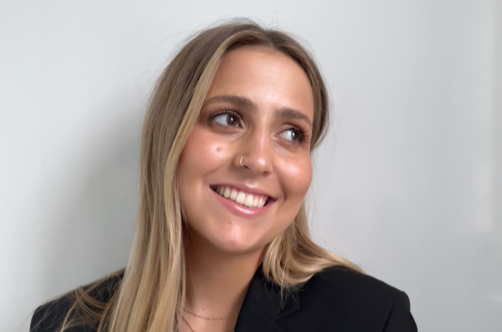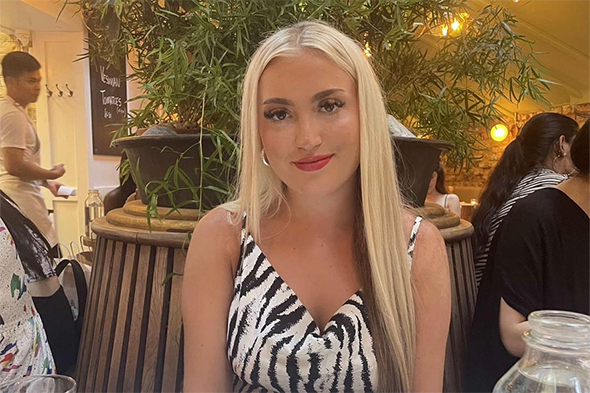
The staff at NTU open days were incredibly welcoming, and after hearing positive stories from other students at NTU I knew it would work for me.
More about Mia
After completing an English and Film & TV BA in 2021, Mia Fairbrother began a career as a Freelance Television Researcher and Writer. Mia reflects on her time at NTU and her incredible achievements which include winning the BAFTA Rocliffe Emerging Writers Prize in 2021.
Why did you choose to study at NTU?
I arrived at NTU after leaving another university the year prior. At my former university, I found the support from the staff to be minimal - so when reapplying to a new university, this became my priority. The staff at NTU open days were incredibly welcoming, and after hearing positive stories from other students at NTU I knew it would work for me. I was also particularly interested in their focus on employability throughout humanities degrees (and Rock City being just down the road…)
What did you learn – both inside and outside of lectures?
Though a lot of the content of my course is not always used in my day to day, I think the breadth of content my course covered has provided me with a comprehensive understanding of the entertainment industry in general. My time at NTU also gave me the space to grow from a teenager to an adult, ready to function in the real world. I am equally thankful for the placement opportunities, as they absolutely gave me an edge when applying to competitive roles after graduation.
I started at NTU as a normal nineteen-year-old eager to learn about a subject I enjoy, but equally one that was living away from home for the first time, excited to enjoy the nightlife and make new pals. And I did just that (which admittedly, sometimes meant those 9am lectures taking the hit) but by the end, I had grown and learnt how to balance it all, coming out with both amazing memories and a first-class degree. If I had gone straight into work after school, I don’t think I’d have been able to learn that skill so gracefully.
It also feels important to note that towards the middle-end of my time at NTU, I also dealt with some health issues – and, to this day, I am blown away by the support NTU offered me during this time. The team went above and beyond to ensure I felt comfortable, and my tutors never made me feel awkward for any adjustments I needed.
What does your current day involve?
As a freelancer, my days rarely look the same. On the one hand, I work as a researcher within unscripted television (think Love Island, First Dates, Big Brother etc) and in these roles often work closely alongside cast, managing their welfare. These roles can vary from being based in office, on set/location, or even in hotels as we hide out with cast members before and after filming.
The writing side of my career is much less regimented and contributing to it can look like anything from writing scripts into the depths of the night to attending networking events and masterclasses alongside writers such as Jesse Armstrong or Lena Dunham. I got my start in writing by winning the BAFTA Rocliffe Emerging Writers Prize in 2021, and since then have built my portfolio through schemes such as the BBC Voices Writersroom (Northern/Midlands Cohort) in 2023. I am now working alongside the NFTS, working with a student script editor to develop a new, original drama script to add to my portfolio. The next step in my writing career is securing an agent.
All these moving parts in mind, my days are always varied. There are certainly busy periods in this industry where it feels like there are not enough hours in the day, but equally quiet periods that mainly entail reaching out to my network as I look for my next job. Freelancing definitely has its perks, but it’s worth noting that as contracts scarcely last longer than a couple of months, 24/7 job security is a luxury I could only dream of!
What attracted you to this field of work?
I was always attracted to the idea of finding a job in a field I was passionate about so I never felt like I was living only for the weekends – and jokes on me, because in television I’m often working through them!
I think the breadth of content my course covered has provided me with a comprehensive understanding of the entertainment industry in general.
What challenges have you faced?
As I’ve mentioned, television is extremely competitive and mainly relies on freelance work. Because of this, there are often gaps between your work, particularly in the early stages of your career when your network is still growing, which of course can cause financial and logistical stress – especially considering that 90% of work is in London, an extremely expensive place to live or commute to. It’s easy to become frustrated by this, especially in an industry rife with new-starters from privileged backgrounds of family connections, and the truth is it is much easier for them – but that doesn’t make it impossible for us. Alongside working, I make it an absolute priority to send several emails a week lining up work as far in advance as possible to minimise those gaps. I apply for every scheme that works to help people in the same position in their career (ScreenSkills is great for this), and I budget my pay checks carefully, so I’m always prepared for a quiet period. Very early in my career, to fill the gaps in my contracts I also taught English online – a flexible job that meant I never went a month without an income.
What have been the highlights and biggest challenges of your career so far?
The biggest challenge in my career was getting my foot in the door in the first place. There’s no easy fix to this, just remember not to be disheartened. There are hundreds, if not thousands, of applicants going for the same jobs, so do not worry if it takes a while to get that first bite. I must’ve applied and sent about 150+ emails before landing my first role in the industry. You just have to persevere and know that once you get that first role, it will only get easier as your network and experience grows.
The highlight of my career has been winning the BAFTA Rocliffe prize in 2021. Though I have gone on to do some great things following this, this prize opened a huge number of doors for me in the writing side of my career, and without it I think I’d still be writing scripts alone in my room that never see the light of day.
What are your plans for the future?
Hazy on the specifics, just a whole lot of telly.
If you had a time machine, what would you go back and tell yourself at uni?
If I had a time machine, I’d force my student self to get runner/production assistant jobs on television sets over the summers. As I mentioned above, the early stages of a television career can be brutal, so to build up experience and a network during a time in my life where I had significantly less responsibilities (financial or otherwise) would’ve made that first year full-time in the industry much easier.
Finally, is there anything else you would like to share?
If you want to work in TV/film, get as much experience as you can while you’re a student!
Choosing just one subject to study at university can be a challenge! If you’re stuck weighing up different subjects, a Joint Honours course could be the ideal solution!
NTU graduate?
Stay connected with the NTU alumni and supporter community.
Still need help?
-

STUDENT PROFILE
Aimee Eaton
EnglishUnited Kingdom
https://www.ntu.ac.uk/study-and-courses/courses/our-students-stories/arts-humanities/aimee-eaton
-

STUDENT PROFILE
Bella
BA (Hons) Spanish & European StudiesUnited Kingdom
https://www.ntu.ac.uk/study-and-courses/courses/our-students-stories/employability/bella-t
-

STUDENT PROFILE
Comfort Akinwole
English and MediaUnited Kingdom
https://www.ntu.ac.uk/study-and-courses/courses/our-students-stories/arts-humanities/comfort-akinwole